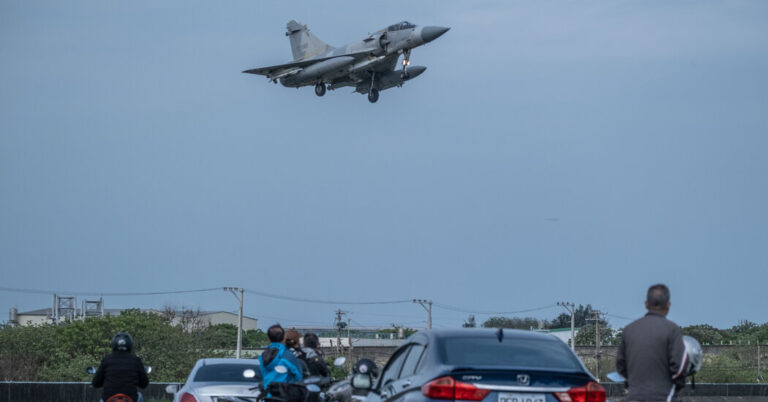China began two days of military drills encircling Taiwan on Thursday, calling it “powerful punishment” against the self-ruled island’s opponents, after Taiwan’s new president vowed to defend sovereignty upon taking office.
The drill was China’s first substantive response to Monday’s inauguration ceremony in Taipei for President Lai Qingde, whom Beijing loathes. Mr. Lai’s party maintains Taiwan’s independence from China, and in his high-profile inaugural address on Monday, Mr. Lai vowed to protect Taiwan’s democracy from Chinese pressure.
China, which claims Taiwan as its own territory, has primarily responded to Lai’s speech with sharply worded criticism. But on Thursday, it escalated its response, announcing it was encircling Taiwan and conducting naval and air exercises to approach the Taiwanese islands of Kinmen, Matsu, Wuqiu and Dongyin in the Taiwan Strait.
China did not say how many aircraft and ships it sent for the latest exercise, but the last large-scale exercise China conducted at multiple locations around Taiwan was held in April last year at Kevin. This was in response to former House Speaker McCarthy’s visit to Taiwan.
“Such exercises put pressure on Taiwan and its surrounding islands, threaten regional stability, and increase the risk of conflict,” said Ou Sifu, a researcher at the Institute for Defense and Security Studies in Taipei, part of Taiwan’s Ministry of Defense. said.
According to Chinese state media, Li Xi, spokesman for the People’s Liberation Army’s Eastern Theater Command, said the drills were a “strong punishment” for the “Taiwan independence army” and served as a “stern warning against Taiwan’s interference and provocation by “external forces,” a reference to the United States.
While vowing to defend Taiwan, Lai sought to signal reconciliation in other ways, signaling an openness to resuming talks and cross-strait tourism that had been frozen in 2016. But China was irritated by his insistence that the two sides were equal (“we are not subordinate to each other,” Lai said), his emphasis on Taiwan’s democratic identity and his warning of threats from China.
After the speech, Beijing accused Lai of pushing for formal independence for Taiwan and said the new president was more dangerous than his predecessor. “The ugly acts of Lai Qingde and others who betrayed the country and ancestors are shameful,” China’s top foreign policy official Wang Yi said this week, according to the Chinese Foreign Ministry. “All Taiwanese secessionists will be nailed to the pillar of shame in history.”
Taiwanese officials and military experts expect China to demonstrate its military might after Mr. Lai takes office. Ma Chin-kun, a professor at Taiwan’s National Defense University, said the People’s Liberation Army’s pressure is likely to continue, including on the islands of Kinmen and Matsu, which are under Taiwan’s effective control and are close to mainland China.
Chris Buckley Contribution report.

